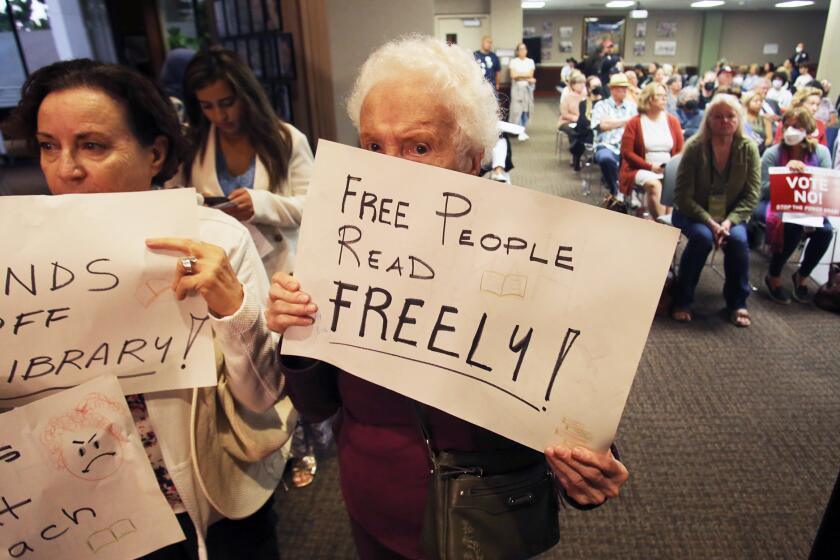Column: Baugh on campaign fliers: They are just making stuff up and throwing it out to see what sticks
The Clash of the Republican Titans for the 48th Congressional seat is turning ugly, as incumbent Rep. Dana Rohrabacher takes first jabs at opponent Scott Baugh, the former O.C. Republican Party chairman.
There’s apparently no lost love between these two former friends.
Last week Rohrabacher campaign mailers accused Baugh of being a lobbyist supported by “never Trumpers” responsible for the proliferation of drug/alcohol rehab homes and high-density development. He also asserted that Baugh is in favor of amnesty for undocumented immigrants.
In a 30-second video spot, Rohrabacher calls Baugh “the lobbyist money can buy.”
Though Baugh joked he liked the picture Rohrabacher used of him in these hit pieces, he had no idea who his supposed “never Trumper” supporters are and says Rohrabacher’s claims that he refused to be photographed with the president are false.
“Dana looks like he is getting desperate to extend his 30-year career of getting nothing done — three bills in 30 years,” says Baugh. “They are just making stuff up and throwing it out to see what sticks.”
Baugh’s never favored amnesty and points to as proof a piece he wrote for the Orange County Register in July 2014.
He also says he’s “never worked for any high-density development in Orange County.”
And as far as lobbying for sober-living homes, “I only advised them to restrict where they were going in Newport Beach over 10 years ago when Newport was creating an ordinance to deal with the proliferation of these homes,” he says.
Baugh’s clients at the time were CRC Health Group and Morningside Recovery.
Former Newport mayor Keith Curry and Newport City Manager Dave Kiff worked on the city’s sober living home ordinance over a decade ago.
Curry says he suggested Baugh “could help them reach reasonable accommodations with the city and neighbor.”
According to Baugh, CRC Health was cooperative with city leaders, agreeing to restrict locations, but he “terminated his relationship with Morningside after they asserted their protection under federal law and the ADA Fair Housing Act.”
Baugh is referring to laws that require those in recovery from alcohol and drug-addiction to be considered “disabled” so that landlords do not discriminate against them.
“If they weren’t going to be good citizens, then I wasn’t going to work with them,” he says.
Kiff says he never viewed Baugh as proliferating homes, “which were already here by 2007-08,” when the ordinance was being drafted.
He recalls speaking with Baugh and CRC Health, which owned Sober Living by the Sea.
Kiff says Sober Living by the Sea entered into a settlement agreement with the city that “has worked out quite well.”
“As you might recall, SLBTS dropped their lawsuit against us following mediation,” Kiff says. “At mediation, we set up a protocol to spread SLBTS homes out (over time), to cap beds overall in the community and in the most impacted area (the Peninsula) and to adopt various ‘good neighbor’ policies for homes.”
Kiff says over the past several years, there have been “nearly zero complaints from city staff or residents about SLBTS homes,” and as the “biggest single operator of beds in Newport, the settlement was a big deal. To the extent Scott helped SLBTS come to that conclusion, kudos to him.”
“Licensed and unlicensed sober-living beds in Newport are probably a third of what they were in 2007-08,” reports Kiff.
Though Baugh’s efforts ended with Newport, the issue is critically important to cities in the 48th District, especially Costa Mesa, where residents vocally oppose their proliferation.
Baugh believes solutions can be found at the federal level by amending the Fair Housing Act, giving local communities more control.
“What you need to do is strike a balance so they can restrict location and concentration as not to disrupt neighborhoods and communities,” Baugh says.
He also wants to see rogue operators engaging in insurance fraud rigorously dealt with.
I contacted Rohrabacher for a comment on the rehab home issue. His representative, Ken Grubbs, sent this on the congressman’s behalf.
“It’s a travesty to put alcoholics and drug addicts in homes next to ordinary families,” he says. “My alternative would be to have rehab centers with doctor oversight placed in industrial and commercial areas rather than inserted into residential areas.”
Grubbs shared this anecdote as well:
Rohrabacher “was alerted to the potential problem when, a few years ago and living across the street from one of these residences, he looked out the window to his front lawn and saw his young son talking with a drug addict under treatment there,” he says. “He did the fatherly thing and told his son not to talk with strangers.”
He was only alerted about this issue a few years ago?
Where’s this guy been?
Granted, he previously lived in Huntington Beach, where the issue had not yet become as pronounced, but Costa Mesa was still in the district and residents were furious.
“If Rohrabacher was serving this district instead of promoting Putin and marijuana, he would have solved this federal problem,” says Baugh.
BARBARA VENEZIA is an opinion columnist writing political and social commentary since 2007. She can be reached at bvontv1@gmail.com
All the latest on Orange County from Orange County.
Get our free TimesOC newsletter.
You may occasionally receive promotional content from the Daily Pilot.



